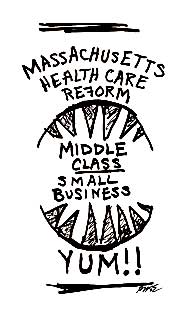You didn’t really think I was going to stop blogging on this topic did you?
 And much to my surprise, my “scribbles” concerning my frustration with folks’ lack of involvement with things like local elections, democracy and poverty seemed to “confuse” a lot of people.
And much to my surprise, my “scribbles” concerning my frustration with folks’ lack of involvement with things like local elections, democracy and poverty seemed to “confuse” a lot of people.
Stubborn and willful blogger that I am, I did another “scribble” on how the Massachusetts Health Care Reform is NOT exactly helping the Massachusetts “Middle Class” or small businesses.
I was talking to yet another small business last week. They felt it was necessary for their economic survival, for the business to go to a health insurance plan with a $2,000 deductible (that is probably a $4,000 deductible per family at least), hoping that none of their employees got too sick.
Yes, I’m getting the vapors all over again.
This is from an Opinion piece in the Boston Globe, September 17, 2007 “Health reform failure” by Steffie Woolhandler and David U. Himmelstein.
“…But this time, most of the uninsured are neither poor nor elderly…”
“The middle class is being priced out of healthcare. Virtually all of this year’s increase was among families with incomes above $50,000; in fact, two-thirds of the newly uncovered were in the above-$75,000 group. And full-time workers accounted for 56 percent of the increase, with their children making up much of the rest….”
“Why has progress been so meager? Because most of the promised new coverage is of the “buy it yourself” variety, with scant help offered to the struggling middle class.”
“And 244,000 of Massachusetts uninsured get zero assistance – just a stiff fine if they don’t buy coverage. A couple in their late 50s faces a minimum premium of $8,638 annually, for a policy with no drug coverage at all and a $2,000 deductible per person before insurance even kicks in. Such skimpy yet costly coverage is, in many cases, worse than no coverage at all. Illness will still bring crippling medical bills – but the $8,638 annual premium will empty their bank accounts even before the bills start arriving. Little wonder that barely 2 percent of those required to buy such coverage have thus far signed up…” (Boston Globe, September 17, 2007).
Mary Eaton
Newburyport